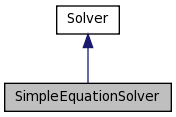SimpleEquationSolver Class Reference
Simple algorithm to solve the equation f==0 over a box. More...
#include <sampling.h>
Inheritance diagram for SimpleEquationSolver:

Collaboration diagram for SimpleEquationSolver:

Public Member Functions | |
| SimpleEquationSolver (const Func &f_, const UserVector< double > &lower_, const UserVector< double > &upper_, Pointer< Param > param=NULL) | |
| int | solve (dvector &start) |
| Solves the problem for a starting point. | |
| int | solve () |
| Solves the problem. | |
Private Member Functions | |
| int | run (const dvector &start, double val, dvector &dir) |
| Determines point at other extreme of box and tries bisections-algorithm, to find zero between them. | |
Private Attributes | |
| const Func & | f |
| const UserVector< double > & | lower |
| const UserVector< double > & | upper |
| int | bisection_iter_max |
Detailed Description
Simple algorithm to solve the equation f==0 over a box.
Starting from a point, finds the other extreme of the box towards gradient direction, and do bisection to find the zero inside the box.
- Parameters:
-
SimpleEquationSolver max iter options integer $ 0$ default 4 Maximum number of gradient steps. SimpleEquationSolver tolerance options double $ 0$ default 1E-4 Function value tolerance. If absolut value of point is <1E-4, we accept the point. SimpleEquationSolver bisection max iter options integer $ 0$ default 1000 Maximum number of iterations in bisection algorithm.
Definition at line 179 of file sampling.h.
Constructor & Destructor Documentation
| SimpleEquationSolver::SimpleEquationSolver | ( | const Func & | f_, | |
| const UserVector< double > & | lower_, | |||
| const UserVector< double > & | upper_, | |||
| Pointer< Param > | param = NULL | |||
| ) | [inline] |
Definition at line 196 of file sampling.h.
Member Function Documentation
Determines point at other extreme of box and tries bisections-algorithm, to find zero between them.
- Parameters:
-
start Starting point. val Value at starting point. dir The direction.
- Returns:
- 0, if we found a zero; 1, if functions values of current point and point at other side of the box have the same sign; 2, if we got a nan in the gradient or as function value; 3, if the iteration limit of the bisection method was reached; 4, if we couldn't compute an initial steplength
| int SimpleEquationSolver::solve | ( | dvector & | x | ) | [virtual] |
| int SimpleEquationSolver::solve | ( | ) | [inline, virtual] |
Solves the problem.
Abstract.
- Returns:
- A status code: 0, if all went right.
- See also:
- solve(dvector&)
Implements Solver.
Definition at line 205 of file sampling.h.
Member Data Documentation
const Func& SimpleEquationSolver::f [private] |
Definition at line 181 of file sampling.h.
const UserVector<double>& SimpleEquationSolver::lower [private] |
Definition at line 182 of file sampling.h.
const UserVector<double>& SimpleEquationSolver::upper [private] |
Definition at line 183 of file sampling.h.
int SimpleEquationSolver::bisection_iter_max [private] |
Definition at line 185 of file sampling.h.
The documentation for this class was generated from the following file:
 1.6.1
1.6.1